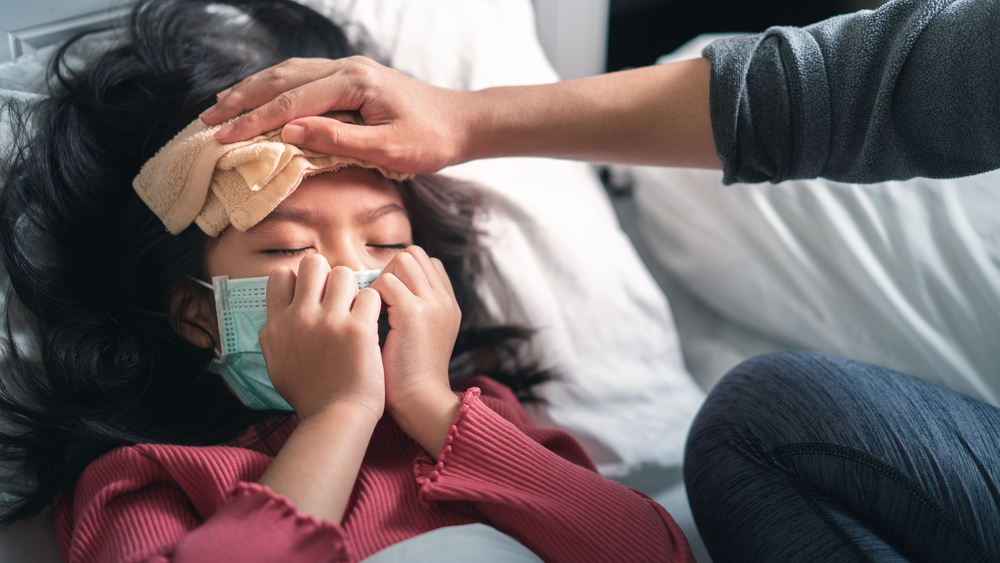What are the Common Symptoms of Covid-19 in Children?

The Covid-19 pandemic has affected people of all ages around the world. While adults are at a higher risk of severe illness and death from Covid-19, children can also be infected with the virus and experience a range of symptoms. As a parent or caregiver, it's important to be aware of the common symptoms of Covid-19 in children so that you can take appropriate action to keep them safe and healthy.
In this blog, we'll discuss the common symptoms of Covid-19 in children, including babies and children under 5. We'll also cover the challenges of diagnosing Covid-19 in babies, the increased risk of severe illness in young children, and tips for preventing and managing Covid-19 in children.
COVID Symptoms in Children
COVID symptoms in children are usually similar to adults, although some kids affected with COVID might not have any signs at all. According to Center for Disease Control and Prevention (CDC), the most common symptom of COVID-19 in kids include:
- Fever
- Cough
- Tiredness
- Headache
- Aches in body
- Loss of taste or smell
- Sore throat
- Congestion or runny nose
- Feeling sick or throwing up
- Diarrhoea
In rare cases, kids with COVID-19 could have serious illnesses, like respiratory failure or multiple system inflammation syndrome (MIS-C). "MIS-C is an uncommon but serious illness that can affect kids and teenagers that have had COVID-19." It is characterised by a fever, swelling, and harm to multiple organs, comprising the heart, lungs, kidneys, brain, and digestive system.
Whilst these are the most general symptoms, it's significant to note that kids might have different symptoms or none. Also, some kids affected with COVID might have a serious illness called MIS-C a few weeks after they got Covid-19. MIS-C can cause inflammation in different parts of the body, which can be life-threatening.
COVID-19 in Babies
Babies are more in danger of having a bad sickness from COVID-19 than older kids, although bad sickness is still uncommon. It can be hard to know the signs of COVID-19 in babies as they can't express their feelings. Also, some signs of COVID-19 in babies can be similar to other illnesses, like the cold or flu.
The CDC says the regular signs of COVID-19 in babies are:
- Fever
- Cough
- Difficulty breathing or shortness of breath
- Fatigue
- Difficulty feeding
- Irritability or fussiness
- Reduced activity or lethargy
- Runny nose or congestion
- Diarrhoea or vomiting
If your baby has any of these signs, it's important to call their health care provider right away. Moreover, it's important to take steps to stop COVID-19 from spreading, for example, washing your hands often, wearing a mask and not getting close to other people outside your house.
COVID in Children Under 5
Kids under 5 yrs old are at higher danger of serious sickness from COVID-19 than older kids, nevertheless, serious sickness is still rare. The signs of COVID-19 in kids below 5 can be the same as those in older kids and grown-ups, although some kids in this age group may not show any signs at all.
The AAP says common signs of COVID in children under 5 are:
- Fever
- Cough
- Runny nose or congestion
- Sore throat
- Diarrhoea or vomiting
- Fatigue
It is important to remember that kids at this age may not be able to tell how they're feeling or not have the words to explain their symptoms. So parents and carers should stay alert to look out for signs of sickness, e.g. changes in behaviour, sleeping patterns, or eating habits.
It's important parents take action to stop COVID-19, like proper hygiene, wearing masks, and not being in larger groups. Kids under 2 yrs old shouldn't wear masks, because it could be a suffocating danger.
Treatment and Prevention
If your child is displaying signs of COVID-19, it's important to phone their healthcare provider right away. Treatment for COVID-19 in kids is mostly supportive and could include fever-lowering medicine, lots of fluids, and rest.
Prevention is the key to quitting the spread of COVID-19. The CDC suggests the below tips to stop the spread of COVID-19:
- Wash your hands often with soap and water for 20 seconds
- Put on a face mask in public and when with people not in your house
- Keep away from others by staying 6 feet away or more
- Avoid big groups and crowded places
- Cover your nose and mouth when you sneeze or cough
- If you're sick, stay home
Also, parents should discuss with their children the significance of proper sanitation and developing healthy habits, such as covering their mouth and nose when they cough or sneeze and washing their hands regularly.
Conclusion
It's important to know the signs of COVID-19 in kids to stop the spread and get early treatment. The signs of COVID-19 in kids are mostly alike to those in grown-ups, albeit some kids may not display any symptoms. Babies and kids less than 5 years have a higher danger of getting severe sickness from COVID-19, so parents and caregivers should be careful in looking for symptoms in this age group.
Prevention is essential to halt the spread of COVID-19, and parents should take steps to make sure their children are adopting healthy habits and following instructions for stopping the spread of the illness. If your kid displays signs of COVID-19, it is important to contact their healthcare provider right away for treatment and guidance. We can work together to keep our kids and towns safe during this pandemic.


